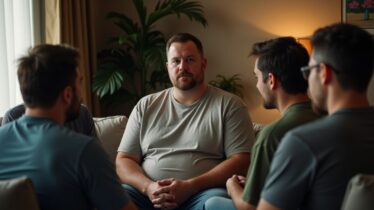The Benefits of Couples Counseling: Improving Your Relationship Through Therapy
Introduction
Relationships, like all good things in life, require time, dedication, and effort to thrive. One way to strengthen your bond and enhance the quality of your partnership is through couples counseling.
This form of therapy focuses on improving communication skills, trust-building, navigating parenthood struggles, and resolving relationship roadblocks that block a couple’s growth together.
In this blog post, we will explore some remarkable benefits that couples counseling offers while providing guidance on how to approach it for maximum results.
Key Takeaways
- Couples counseling can help improve communication skills, trust-building, and effective conflict resolution techniques.
- Seeking counseling is not a sign of weakness, but rather an act of courage that prioritizes the health and wellbeing of a relationship.
- Therapy provides support for navigating parenthood and other life challenges while promoting shared accountability and responsibility in building a strong partnership.
- Signs that indicate it may be time to seek couples counseling include ongoing conflict and communication breakdown, feeling disconnected from one another, infidelity or betrayal, differences in goals or values causing strain, and difficulty resolving issues on your own.
Understanding Couples Counseling
Couples counseling is a form of therapy that helps couples facing issues in their relationship to work through these challenges together, with the guidance and support of a licensed therapist.
Couples counseling, also known as relationship or marriage therapy, is a type of psychotherapy specifically designed to help partners in romantic relationships address and resolve problems they face within their relationship.
The primary goal of couples counseling is to improve communication, increase understanding, and strengthen the emotional bond between both individuals.
During couples counseling sessions, a trained therapist works with the couple to identify specific issues impacting their relationship dynamics and emotional wellbeing. With the therapist’s guidance, partners will learn new skills such as active listening, empathetic responses, and effective conflict resolution techniques that can be applied directly into their day-to-day interactions.
For example, consider a couple struggling with parenting challenges; the therapist might offer tools for navigating these issues together while keeping both individual needs in mind.
The Role Of A Therapist In Couples Counseling
The role of a therapist in couples counseling is to facilitate open communication and provide an impartial perspective on the relationship dynamics. They work with both partners to identify patterns, triggers, and issues within the relationship that may be causing distress or conflict.
A good therapist will also help each partner understand their own emotions and behaviors, as well as those of their significant other.
It’s important to note that therapists don’t act as judges but rather help each partner feel heard and understood. While they may offer suggestions for improving the relationship or resolving conflicts, ultimately it’s up to the couple to implement these changes outside of therapy sessions.
Additionally, if individual issues like trauma or mental health concerns are discovered throughout sessions, couples’ counselors may recommend pursuing individual therapy alongside marital counseling.
Common Issues Addressed In Therapy
Couples counseling can address a variety of issues that arise in relationships, such as:
– Communication breakdown
– Trust and intimacy issues
– Sexual conflicts or dissatisfaction
– Infidelity or betrayal
– Different values or goals
– Parenting challenges
– Financial disagreements
– Lack of emotional connection
– Inability to resolve conflicts on your own
Working with a therapist can help you and your partner gain insight into these issues, learn new skills to navigate them effectively, and ultimately improve the quality of your relationship. It’s important to remember that seeking therapy is not a sign of weakness or failure – on the contrary, it takes courage and commitment to prioritize the health and wellbeing of your relationship.
Benefits Of Couples Counseling
Couples counseling provides a multitude of benefits, including improved communication skills, strengthened trust and intimacy, effective conflict resolution, shared accountability and responsibility, and navigating parenthood and other challenges.
Improved Communication Skills
Couples counseling can significantly improve communication skills within a relationship. A therapist can help partners identify problematic patterns of communication and provide tools to effectively express their needs, desires, and feelings.
These skills are essential for building trust and intimacy in a relationship as they enable couples to understand each other’s perspectives better. For instance, using “I” statements to express how one feels rather than placing blame on the other person can prevent arguments from escalating into full-blown conflicts.
Additionally, healthy communication is crucial when navigating parenthood or dealing with other challenges together. Parenthood brings significant changes that require clear and effective communication between partners for successful parenting outcomes.
In therapy sessions, couples learn how to practice active listening, manage conflicting opinions respectfully, and reduce misunderstandings through better communication strategies.
Strengthened Trust And Intimacy
Couples counseling can help to strengthen trust and intimacy in a relationship, which is crucial for building a strong foundation. Through therapy, couples can learn to communicate more effectively, build emotional resilience, and deepen their understanding of each other’s needs and desires.
For example, suppose one partner has difficulty trusting the other due to past experiences. In that case, couples therapy can help them both understand how this impacts their interactions and work towards rebuilding trust over time.
Overall, working together through counseling sessions promotes deeper connections between partners while helping to solidify mutual respect and support in handling even the most challenging moments in life’s journey.
Effective Conflict Resolution
Effective conflict resolution is a crucial aspect of couples counseling. It involves learning how to communicate and navigate disagreements in a healthy and respectful manner.
Conflict is inevitable in any relationship, but it’s how you handle it that can make all the difference. Couples learn tools and techniques to help them stay calm and centered during arguments, avoid blame and criticism, actively listen to each other’s perspectives, and work towards finding solutions together.
Research shows that effective conflict resolution skills are linked to higher levels of marital satisfaction and overall emotional resilience. It’s important for couples to understand that disagreement doesn’t necessarily mean the end of the relationship- quite often navigating through differences can strengthen bonds.
One common technique taught in therapy sessions is taking breaks from difficult conversations when things start getting heated or overwhelming – this helps both partners regain composure before continuing the conversation later.
Effective communication skills also include body language reading which plays an important part in understanding nonverbal signals from your partner during tough times.
Shared Accountability And Responsibility
In couples counseling, shared accountability and responsibility are essential for building a strong and healthy relationship. It means taking ownership of one’s actions, behaviors, and feelings in the partnership.
Couples who share accountability take equal responsibility for making the relationship work by acknowledging their role in conflicts or challenges that arise. For instance, if there is an ongoing issue with communication breakdown in the relationship, both partners must be willing to improve their communication skills instead of blaming each other for it.
This way of approaching conflicts promotes unity in a partnership rather than causing further stress or resentment.
Navigating Parenthood And Other Challenges
Parenthood and other life challenges can put a strain on any relationship. It’s not uncommon for couples to experience conflicts related to differences in parenting styles or managing family finances.
Fortunately, couples counseling can provide valuable support during these trying times.
Through counseling sessions, couples can also learn new strategies for coping with stress and uncertainty while balancing the demands of parenthood or other major life changes.
Counseling provides an opportunity to process emotions that may be impacting the relationship and work through potential roadblocks in a positive way.
It’s worth noting that seeking help isn’t just necessary when facing significant challenges. Even smaller issues – like disagreements over household chores or planning date nights – are often best addressed early on rather than waiting until things get out of hand.
Signs You Might Need Couples Counseling
If you find that you are constantly having conflict and communication breakdown in your relationship, feeling disconnected from one another, experiencing infidelity or betrayal, disagreeing on major goals or values, or unable to resolve issues on your own, it may be time to seek couples counseling.
Ongoing Conflict And Communication Breakdown
Couples may experience ongoing conflict and communication breakdowns, which can be a sign that therapy is needed. This could manifest in frequent arguments, no longer listening to each other, or not understanding each other’s perspectives.
These patterns of interaction can become entrenched and lead to resentment and disconnection. In couples counseling, a therapist can help identify these unproductive behaviors and provide strategies for improving communication skills.
Therapy sessions can also offer a safe space for couples to explore their feelings, needs, desires, and fears without fear of judgment or retaliation from the partner.
Feeling Disconnected From One Another
It’s common for couples to feel disconnected from time to time. The fast-paced nature of our daily lives can make it challenging to stay engaged with each other. However, if feeling disconnected persists, it could indicate a deeper issue that needs addressing.
Couples counseling can be an effective way to work through this roadblock and improve emotional intimacy in the relationship. A trained therapist can help explore any underlying issues causing the disconnect and equip both partners with practical tools to reconnect on a deeper level.
Infidelity Or Betrayal
One of the most challenging issues that can arise in a relationship is infidelity or betrayal. It can be difficult to move past these breaches of trust on your own, but couples counseling can help you navigate this complex road towards healing and rebuilding.
A therapist trained in relationship dynamics and emotional resilience can facilitate honest exploration of feelings, helping both partners express their pain, anger and sadness in a safe place.
Counseling sessions provide an opportunity for the couple to understand what led to infidelity or betrayal, examine patterns within the relationship that contributed to it, promote empathy and forgiveness, as well as building communication skills needed to start rebuilding from scratch
Different Goals Or Values
Couples may face an impasse when they have different goals or values in life. These differences can cause strain and conflict in a relationship, leading to feelings of frustration and disconnection.
Couples counseling can be highly beneficial for couples dealing with this issue, as it provides a safe space to explore the underlying reasons behind these differences. A therapist can help both partners understand each other’s needs and priorities, facilitating honest communication that helps navigate this tricky issue.
Unable To Resolve Issues On Your Own
If you find yourselves struggling to resolve issues on your own, couples counseling can provide a safe and neutral space for both partners to explore their feelings and work through problems.
It’s common for couples to reach an impasse where disagreements become cyclical or hurtful patterns develop, making it difficult to communicate effectively. In therapy, a trained professional can help facilitate productive discussions that lead to resolution and emotional healing.
By working together with a therapist, you may be able to identify root causes of conflicts within your relationship that may not have been immediately apparent or difficult to address without guidance.
How To Get The Most Out Of Couples Counseling
Find a reputable couples therapist, be open and honest in sessions, practice what you learn outside of therapy, and continually work on your relationship to get the most out of couples counseling.
Find A Reputable Couples Therapist
Finding the right couples therapist can be a crucial step in improving your relationship. Look for a licensed and experienced therapist who specializes in working with couples, and whom you both feel comfortable with.
It’s important to note that finding the right therapist may take time and effort, but it’s worth investing in someone who can help guide you towards healing and growth. Keep an open mind during the process, be willing to ask questions and share concerns about what you hope to gain from therapy, and trust that together as a team – you will work towards achieving positive outcomes.
Be Open And Honest In Sessions
When attending couples counseling, one of the most important things is to be open and honest in sessions. This means sharing your thoughts, feelings, and concerns with your partner and therapist without fear of judgment or criticism.
One way to practice honesty in therapy is by actively listening to your partner’s perspectives and acknowledging their feelings. For example, if you disagree with something they say during a session, it’s essential to express yourself respectfully while still validating their emotions.
Research shows that couples who are honest with each other during counseling are more likely to experience positive outcomes than those who hold back or avoid difficult conversations.
Practice What You Learn Outside Of Therapy
One of the most important aspects of couples counseling is putting what you learn into practice outside of therapy sessions. Here are some tips on how to do this effectively:
1. Set aside dedicated time for each other: Schedule time together and make it a priority. This can include date nights or simply spending time talking and connecting.
2. Use active listening skills: Practice really listening to your partner without interrupting or getting defensive. Repeat back what they say to show you understand.
3. Implement conflict resolution strategies: When conflicts arise, use the skills you learned in therapy to work through them together. Take responsibility for your part in the conflict and work towards a solution that works for both of you.
4. Show appreciation and gratitude: Make sure to acknowledge and express gratitude for the positive things your partner brings to the relationship.
5. Continue self-reflection: Remember that couples therapy isn’t just about fixing problems in the relationship, but also about personal growth and awareness. Keep reflecting on your own actions, thoughts, and behaviors outside of therapy.
By practicing what you learn outside of therapy, you can continue to strengthen your relationship and promote lasting improvements in communication, trust, and emotional wellbeing.
Continually Work On Your Relationship
In conclusion, couples counseling can be a powerful tool for improving and strengthening your relationship. Through therapy, you can gain a better understanding of underlying issues and patterns that may be hindering your relationship’s growth.
Effective communication skills, trust building, conflict resolution, shared accountability, navigating parenthood struggles are just some of the many benefits couples therapy provides.
However, it is important to remember that not every relationship will benefit from counseling and results cannot be guaranteed.

Dr. O “TheTeenDoc.” helps clinicians communicate better with their teen patients. She speaks, blogs www.TheTeenDoc.com, researches and consults on communicating with teens. She has written two e-books for parents and teens on communicating about the challenging subject of sexual health. You know, teens that bring chief complaints of belly pain, social crisis, emotional turmoil and obnoxious parents. Or, is it the parents with obnoxious teens? Sometimes she mixes that complaint up.
Dr. O speaks www.TheTeenDoc.com to and is consulted by clinicians who want advice managing difficult teen and teen-parent situations. These situations frustrate clinicians and slow down their clinics making them wonder if they’ll ever walk out the door for the day. Every day, in her own practice, Dr. O helps clinicians communicate better with teens and helping you is another level of reward. Her talks are fun and informative, and her delivery empowers clinicians to actually think teens are an awesome group to work with. Her energy about teens is contagious and has inspired her coaching clients to have less fear and more confidence with the teens in their panel. Her dedication to seeing you succeed with a group she is so passionate about is what makes Dr. O’s Lounge the place you want to be!
If you are a clinician that has teen’s in your practice, from pediatrics to internal medicine, the person with whom you need to connect is Dr. O “TheTeenDoc!” You can listen to a complimentary audio “The Art of Teen Medicine” and recommend her e-book “Are You Serious? It’s Just Sex!” to your patients. And while you’re there, become part of Dr.O’s Lounge.
Specialties: consulting, coaching, counseling, mental health, research, seminars, spanish, public speaker, teaching, communications between teens and adults



